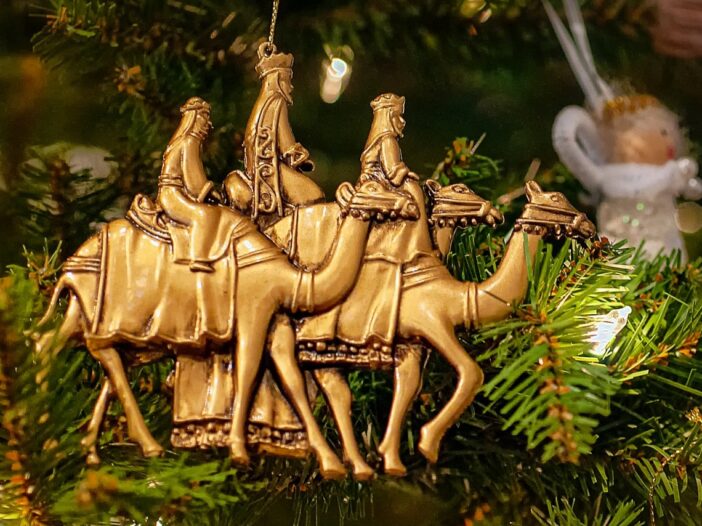
The beauty of the Bible is you can read it repeatedly and still discover new facets of God’s truth you didn’t know before.
I experience that every time I re-read Matthew 2 and Luke 2, which include the accounts of the Wise Men and the shepherds, respectively. Here are five truths about their visits to Jesus that God impressed upon me this Christmas.
1. Unmerited favor
The Wise Men’s high status didn’t make them more worthy to experience God’s glory and presence. The shepherds’ lowly status didn’t make them any less worthy. God directed Matthew and Luke to include the accounts of the shepherds and Wise Men to underscore that God’s favor, His divine kindness and compassion, is His gift to dispense—and He gives it freely to all.
2. Unprecedented message
The angel’s message to the shepherds condensed the Gospel into two verses (Luke 2:11–12). Sweaty ranch hands in a starlit field were the guests of honor to hear history’s best news ever. A helpless babe was born—who was the Savior of the world!
That babe was also Wonderful Counselor, Mighty God, Everlasting Father, Prince of Peace (Isaiah 9:6). No matter how many times I read that, It boggles my mind. (Equally mind-blowing: the shepherds that tended the lambs for Temple sacrifice were the first to see the Lamb of God who takes away the sins of the world.)
3. Unrestricted access
Before the shepherds and Wise Men visited Jesus, all world religions revolved around a principle of separation. Gods could be approached only if one followed rigid rules. Even so, access was restricted; intermediaries (priests) were a “must.” But the shepherds and Wise Men experienced no restrictions when they visited Jesus. They were with Him.
Let that sink in. God couldn’t impress upon us a more powerful image of Immanuel, God With Us!
The intimate closeness of those visits underscores God’s desire for us to have no distance between us and Him. He yearns for us to be in the relationship He’s intended for us since time began.
God’s final exclamation point on that came more than thirty years later when the Temple veil tore in two the day Jesus died. That was God saying, “No more barriers or restricted access. I made a way for you to be with Me forever, and it is finished.”
4. Unfettered worship
The shepherds and Wise Men worshipped Jesus in the purest sense of the word. Their worship was truly “worthship”—demonstrating Jesus was worthy of being honored.
Matthew 2 says the Wise Men “fell down” (prostrated themselves) and “worshipped”—which literally means to kiss the ground while prostrating oneself before a superior.
Today some people call worship the “kissing ground” between us and God. That beautiful image is a powerful reminder of why and how we should worship: with holy, loving, intimate reverence that includes a physical act of adoration and submission to the One whose Name is above all names.
We don’t know what the Wise Men did after their profound experience with Jesus, but Luke 2 says the shepherds started telling others about Jesus right away (vs 17) and kept praising God when they returned to the fields (vs 20). Their visit with the living God shouted that relationship—not ritual—governed worship.
5. Unrestrained giving
Much has been written about the lavish gifts the Wise Men prepared for Jesus. They had financial and medicinal value. Symbolically, they represented Jesus’ royalty as eternal king (gold), His office as High Priest (frankincense), and His sacrificial death (myrrh). Matthew 2:11 embraces all those truths, but I want to camp on another truth that many miss: the verse’s cultural truth.
Gold, frankincense, and myrrh were gifts that a subjugated country gave to a conquering king. The gifts acknowledged their total subjection to the conqueror. Somehow the Wise Men knew Jesus was worthy of those gifts and their obeisance. Jesus was their ultimate king. Their gifts were a beautiful model of submission—not born from duress but from love.
The shepherds gave no tangible gifts. But God’s favor also rested on what they gave: their time, gratitude, adoration, worship.
The key in both cases is the motivation for giving. The Wise Men and shepherds understood Jesus was more than the world’s Savior. They realized He was born for THEM. As their hearts overflowed with that truth, they gave to Jesus without restraint.
Our time, talents, and treasures are ours because God first gave them to us. We should never hesitate to give them back to our gracious Father.
Conclusion
We have unmerited favor with God and unrestricted access to Him. We’ve heard the unprecedented message of Christ’s birth. So let us respond with unfettered worship and unrestrained giving. O come let us adore Him!
Never miss a post!
*********************
I pray you have a glorious Christmas, full of wonder at all God has done for you. As I take a short break to unplug, please pray for God’s wisdom to rest on me while I spend the last three days of this year in what I call “pray and plan.”
In the meantime, please enjoy this version of “O Come All Ye Faithful,” sung in Westminster Abbey at Christmas. The song includes many more verses than what Americans traditionally sing. Listen to all the verses with their breathtaking harmony; they tell the entire Christmas story in glorious detail!





Thank you, Lana!
MerryChristmas!❤️💚
Same to you, Joan!